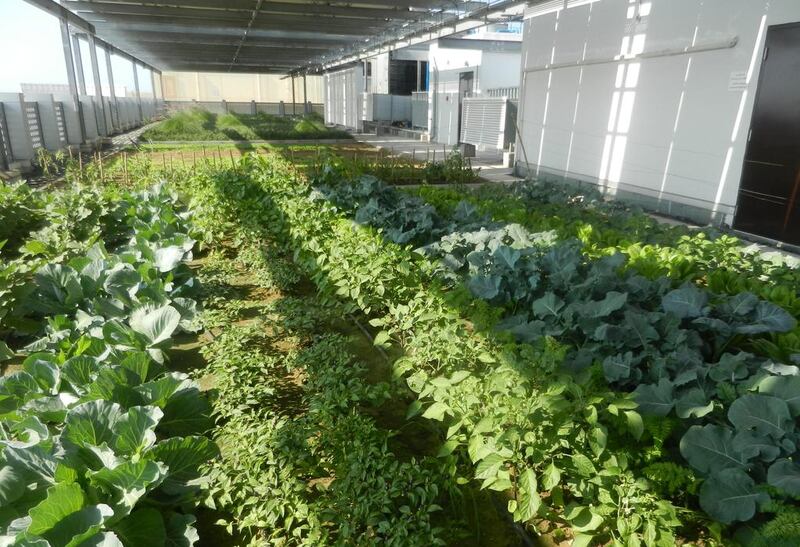ABU DHABI // Urban agriculture in the UAE has the potential to surmount the environmental obstacles it faces to provide fresh produce to residents, agricultural experts say.
The hot weather is the main problem for farmers, but staff at Dubai Electricity and Water Authority’s (Dewa) building in Al Quoz have successfully grown cabbages, tomatoes and cauliflower on the rooftop.
They use Green Mat, a subsurface farming medium that helps to conserve irrigation water. It is developed by Landex Green Environmental Solution in the UAE.
Dewa’s 2,500-square-metre garden contains a 300-square-metre vegetable plot with more than 400 plants.
A recent farming cycle produced 200 cabbages and 200 cauliflowers, said Martin Jose, a Landex marketing manager.
Plant selection is crucial to conserving water, he said. In summer months the garden shifts to growing vegetables such as okra, beans and particular varieties of melon which need less water to thrive.
“If [the garden] consumes too much water, there is no way we can claim that it is environmentally friendly,” said Mr Jose.
Having the garden also helps to reduce the building’s cooling expenses and lowers the indoor temperature by as much as 10°C.
At this week’s Global Forum for Innovations in Agriculture conference, which concluded yesterday in the capital, urban agriculture practitioners and companies discussed the sector’s global progress.
Dr Rashid bin Fahad, the Minister of Environment and Water, said continued reliance on traditional agricultural practices would not resolve food supply challenges. “The role of technology and innovation in the advancement of the agricultural and food production sector is no longer a subject of dispute among scholars,” he said.
“The question that remains unanswered is the ability of the international community to deploy these technologies and ensure the application of ideas and innovative solutions for the benefit of millions of owners of small and medium-sized agricultural ventures.”
Ben Flanner, a speaker at the conference and president of Brooklyn Grange, a rooftop farming company in New York City, said his company grew more than 22 tonnes of organic produce a year. Two-thirds of that are sold commercially.
Duplicating that kind of success in cities such as Abu Dhabi and Dubai will require solutions that can work around or embrace the intensive heat, dust and lack of water.
That is according to Oscar Rodriguez, a host at the conference and director of Architecture and Food, a consultancy in Britain that works with building owners to use rooftops to farm fruits and vegetables.
“Here, the sun is so strong. In Islamic architecture, the narrative has been ‘how do I protect myself from the sun?’ Narrow passages, strategic shading, it’s about that relationship with the sun,” said Mr Rodriguez, who moderated an urban agriculture round-table discussion yesterday.
“Food is a very good barometer of how successful we are at managing our relationships with the climate, temperatures, sun, water, everything.”
Mr Rodriguez said although the use of rooftops for farming was an attractive idea, “there are fundamentals that have to be guided by a submission to the conditions”. Farming indoors could be an option to avoid the intensive heat, given the existing technology for viable production, he said.
But expenses such as rent could be prohibitive and extensive technical expertise is required.
At the conference, a company called AeroFarms presented its vertical farming product, which it claimed could grow several varieties of leafy green vegetables and herbs indoors without using sunlight or soil.
esamoglou@thenational.ae





